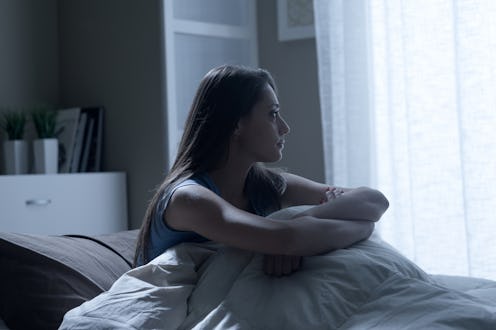Life
6 Everyday Habits That Are Messing With Your Sleep Cycle

Getting enough hours of sleep each night is important for your health, but hours alone don't make for a good night's rest. Your sleep quality matters as well, and part of good sleep quality involves moving properly through all the stages of sleep. There are a number of habits that can interrupt your sleep cycle, and some are so unsuspecting, you might not even realize you're doing them.
"Sleep is not a single 'shut-down' state," Dr. Roy Raymann, resident sleep expert & VP of Sleep Science & Scientific Affairs at SleepScore Labs, tells Bustle. "During sleep, your brain body is active at different levels."
First, your body starts with transitioning from being awake to light sleep, a stage where it's still easy to wake up. Gradually, you move on to a deeper and more restorative sleep, where it is harder to be aroused. Finally, you progress into Rapid Eye Movement (REM) sleep, where most of your dreams occur.
"This journey (wake-light-deep-REM) is considered a sleep cycle and takes approximately 90 minutes," Dr. Raymann says. "Then the process repeats again, and throughout a night of 7.5 hours, you most ideally would go through five sleep cycles."
Disrupting your sleep cycle at any given stage causes your body will start a new cycle again. "Although all stages in a cycle are important, the most health and wellbeing benefits have been related to Deep and REM sleep, so it is important to progress through the sleep cycle to get to these stages to get the benefit."
To ensure you're going through your sleep cycle, experts say you'll want to pay attention to your habits.
1Drinking Too Many Liquids
Although alcohol and caffeine do have an effect on your sleep cycle, drinking too much liquids of any kind can have an effect as well, since excessive drinking at night can cause nocturnal awakenings to visit the bathroom. "Be modest on the intake, and make sure to use the bathroom prior to sleep," Dr. Raymann says.
2Sleeping With Pets
Although your four-legged friend might bring you comfort, pets have different sleep patterns than humans. "We typically follow a binary sleep pattern, being awake at day and at sleep at night," Dr. Raymann says. "Most house animals have multiple sleep and wake episodes throughout the 24 hours, and some are even most active during the night. Your cat might jump on your bed or your hamster might decide to use his running wheel, when you are busy forming memories during your sleep."
3Eating Certain Foods
Certain foods like chocolate, peppermint, and fried, fatty or spicy foods can disrupt your sleep cycle if you eat them too late in the evening, since they might trigger reflux and heartburn. "For some people, the mint in the toothpaste can already trigger reflux," Dr. Raymann says. "The acidic stomach juices that flow back to your esophagus will wake you up most of the time it will happen, just ruining your sleep cycles."
4Nighttime Workouts
"Although working out is an essential part of a healthy lifestyle and can help you sleep better at night, working out too close to bedtime raises a person’s body temperature too much such that it is more difficult to fall asleep," Dr. Sujay Kansagra, Mattress Firm’s sleep health expert, tells Bustle. "Additionally, endorphins and adrenaline from a workout further prevent feelings of sleepiness and can delay sleep."
5Having A Nightcap
Many people find that alcohol can be helpful for those wanting to wind down at night, but it can actually mess with your quality of sleep. "Although alcohol may induce relaxation and feelings of sleepiness, it disrupts deep sleep, making you wake up earlier than you want," Dr. Kansagra says. "The best practice is to always go to bed with a blood alcohol content of zero in order to avoid sleep disruptions throughout the night."
6Falling Asleep With The TV On
Many people fall asleep with the television on or use electronic devices right before sleep without realizing how harmful these habits are to their sleep health. "The blue light emitted from the television and other devices can alter a person’s circadian rhythm, making it harder for them to feel sleepy at bedtime, and the noise from the television can cause you to wake up at various points throughout the night, particularly when in lighter sleep stages," Dr. Kansagra says. "This nasty sleep habit is one of the leading disrupters to a good night’s sleep and can be extremely detrimental to a person’s sleep health and productivity during the daytime."
To make sure you're getting into all stages of your sleep cycle, avoid these habits before bedtime.